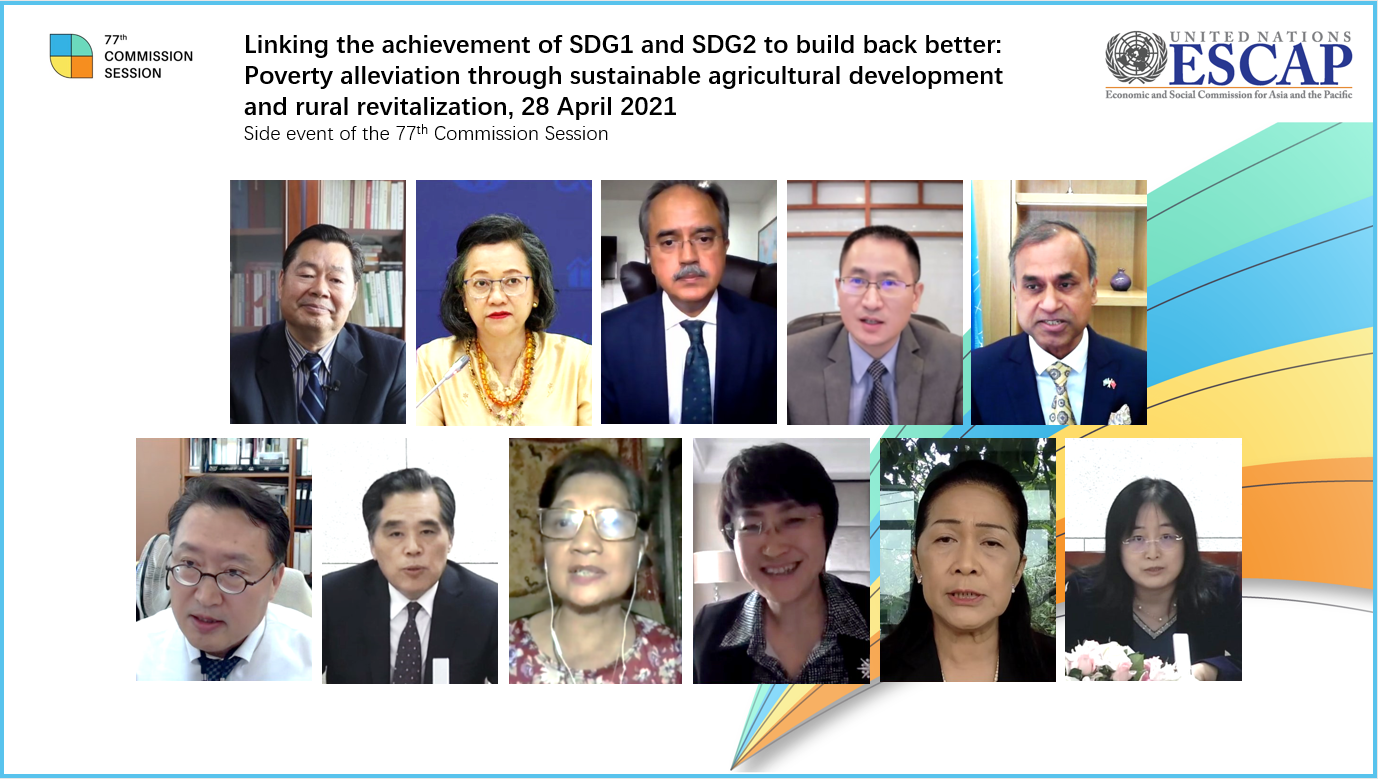CSAM facilitates dialogue on poverty alleviation through sustainable agricultural development and rural revitalization at 77th session of the Economic and Social Commission for Asia and the Pacific (ESCAP)

Meeting Documents
A virtual event, titled “Linking the achievement of SDG1 and SDG2 to build back better: Poverty alleviation through sustainable agricultural development and rural revitalization” held on 28 April 2021 alongside the 77th session of the Economic and Social Commission for Asia and the Pacific (ESCAP) showcased lessons learned from poverty alleviation, rural revitalization and international cooperation initiatives, and discussed how such experiences could be upscaled in the region to build back better from the socio-economic impacts of COVID-19.
Organized by the Permanent Mission of the People’s Republic of China to ESCAP and International Poverty Reduction Center in China (IPRCC) with the support of ESCAP’s Centre for Sustainable Agricultural Mechanization (CSAM), the event was opened by a welcome message of the Vice Administrator of China National Rural Revitalization Administration, Hong Tianyun, who elaborated on China’s achievements through its strategy of targeted poverty alleviation in rural areas, and the spirit of community demonstrated by several poverty reduction cooperation projects in the Asia-Pacific region.
The deliberations highlighted that consolidating poverty alleviation achievements and rural revitalization will be the key to prevent people from falling back into poverty when facing shocks, and ‘building back better’ whilst tackling the targets set out for SDG1 and SDG2. United Nations Under-Secretary General and Executive Secretary of ESCAP, Armida Salsiah Alisjahbana, commented that “the modernization and improvement of the agricultural sector and of food systems at large are fundamental for ‘building back better’ and maintaining poverty eradication gains.”
The event was also attended by the Ambassador of Pakistan to Thailand and Permanent Representative of Pakistan to ESCAP, H.E. Asim Iftikhar Ahmad; the Permanent Representative of China to ESCAP, Ke Yousheng; the UN Resident Coordinator in China, Siddharth Chatterjee and guest speakers from government, academia, international organizations, farmers associations and private sector. In a dialogue moderated by the Head of CSAM, Li Yutong, they shared highlights of domestic achievements and international initiatives on poverty alleviation targeting the agricultural sector, together with recommendations on measures for preventing people from falling back into poverty in the context of the pandemic and other shocks that affect most severely vulnerable groups involved in food production and distribution.
Sharing of the knowledge and lessons accumulated from the region’s successful experiences in poverty alleviation can not only benefit countries in their struggle to get rid of poverty but also contribute to their food security goals and help determine a pathway towards more sustainable and resilient food systems at the global level. In line with the fact that most poverty alleviation efforts in the region have targeted rural agricultural areas and communities involved in food systems, the event’s deliberations and recommendations will be summarized in inputs that will inform the upcoming Food Systems Summit.

